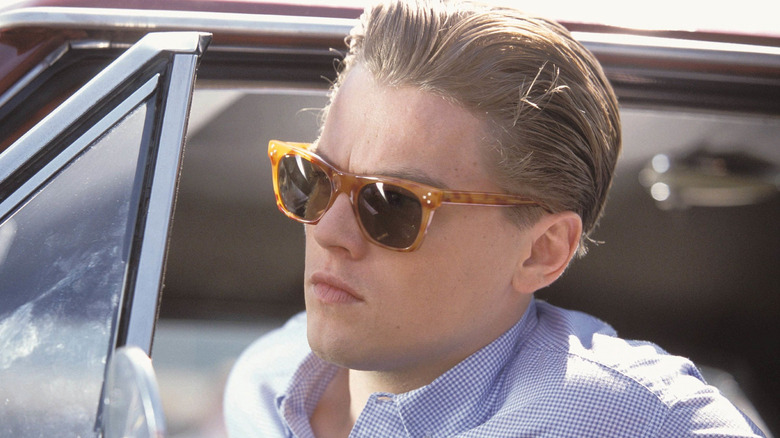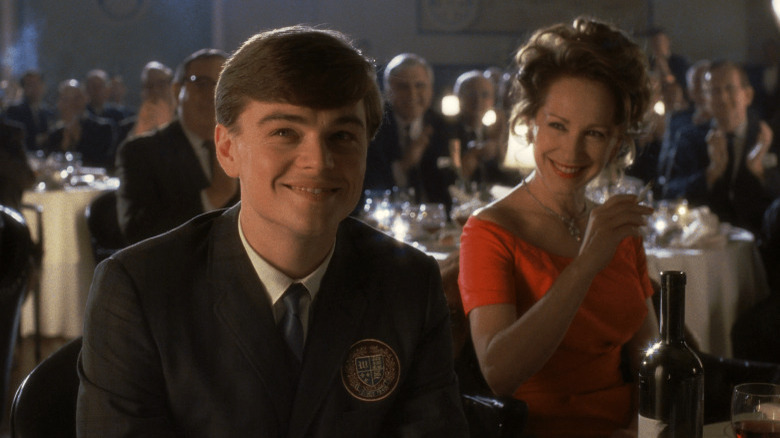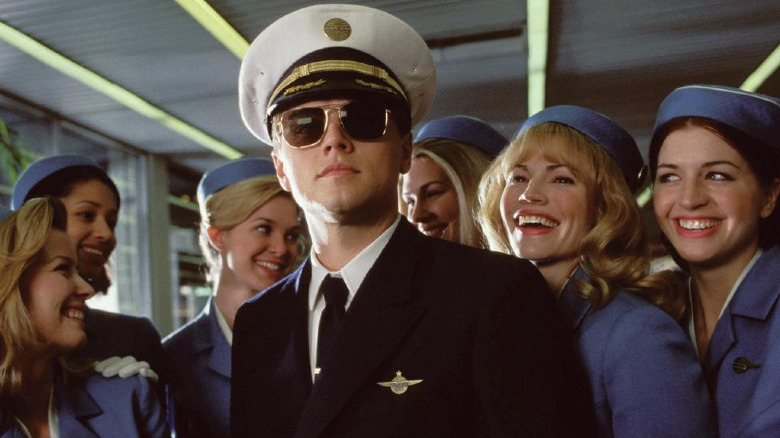The Real Frank Abagnale Jr. Was Speechless After Steven Spielberg Showed Him Catch Me If You Can
"Catch Me If You Can" is one of those low-key Steven Spielberg classics that, had it been made by a lesser-known director, might have well been heralded as their masterpiece. Released in 2002, the movie stars Leonardo DiCaprio as Frank William Abagnale Jr., a real-life con artist who spent his late teen years masquerading as an airline pilot, a doctor, and a lawyer in the 1960s, all while forging checks to bankroll his escapades. The film actually leaves out some of the wildest details from Abagnale's 1980 autobiographical book of the same name, like how he posed as a professor of sociology at Brigham Young University. And to think we were this close to getting a scene or more where DiCaprio's playboy swindler infiltrates the ranks of that (mostly) Mormon institution.
In reality, of course, the veracity of Abagnale's claims about teaching at BYU and his other illicit activities has come under heavy scrutiny over the decades. At this point, it's hard to say how much of the book version of "Catch Me If You Can" really occurred, which in many ways feels appropriate. Its subject was, at an early point in his life, an expert in the art of telling people what they want to hear after all. Spielberg's film even leans into that idea by framing its story as being part of Abagnale's possibly unreliable confession about his deeds on a 1977 episode of the TV game show "To Tell the Truth."
Whatever the truth may be, it seems Spielberg's movie was close enough (or, at the very least, felt close enough) to reality to leave the actual Frank William Abagnale Jr. speechless the first time he saw it.
'An experience I will never forget.'
Speaking to Total Film Magazine as part of the publication's 20-year anniversary retrospective for the film, the real Frank Abagnale Jr. remembered receiving a call from Steven Spielberg's assistant at the time, Kristie Macosko, to attend a screening of "Catch Me If You Can" prior to its release. Later that evening, Abagnale met Macosko and executive producer Barry Kemp at a "large" theater to see the movie for the first time:
"No words can explain the emotion and how surreal it was to sit and watch my life be replayed in front of me. An experience I will never forget. When I came out of the theatre, Kristie handed me a wireless phone and said, 'Mr. Spielberg would like to speak to you and get your comments.' I was so taken by what I had seen in the movie, I said that I would have to speak with him in a few days as I was not able to gather my thoughts to make any comments at that time."
If, naturally, you find yourself doubting the authenticity of Abagnale's comments (if only just a little), then it's worth keeping in mind just how far removed he is from his life as a teen criminal. Since being caught and arrested by the FBI in 1970, Abagnale has spent his days acting as a check fraud consultant to the U.S. government and helping to fight against fraud and identity theft in the private sector. Around the time Spielberg's film arrived, Abagnale even issued a statement on his official website (via the Los Angeles Times), clarifying that his "Catch Me If You Can" co-author, Stan Redding, "over dramatized and exaggerated some of the story. That was his style and what the editor wanted."
A Spielberg film that even Spielberg enjoys
Confidently crafted and amusingly risqué, "Catch Me If You Can" is as breezy as it is moving. It's also easy to spot the parallels between Frank Abagnale Jr. running away from home to pursue a life of crime in the wake of his mother and father's divorce and the painful effect his own parents' separation had on a young Steven Spielberg. The director's personal connection to the movie's subject matter very much manifests itself in his filmmaking, so it's nice to know that Spielberg can actually enjoy watching the final product for himself. (Believe me when I say that being able to feel good about one's work like that is rarely the case for us creative types.)
Spielberg confirmed as much in a letter he sent to the real Abagnale in 2015 (as obtained by Total Film):
"This is one of the rare occasions in my own filmography where I can watch my own work without a speck of regret for the things I wanted to put on the screen and for whatever reason did not. I can enjoy it with pure objectivity. For me that's rare and I thank you for putting this is in my hands and for your decades of dedication to the FBI and your family."
Is that the truth? I would like to think my dear, close friend Steven Spielberg is too sincere to ever lie about something like that. But even if he's taking a leaf out of the real Abagnale's book and "over-dramatizing and exaggerating" because it sounds better on paper, I myself can vouch that "Catch Me If You Can" still holds up great 20 years later.


